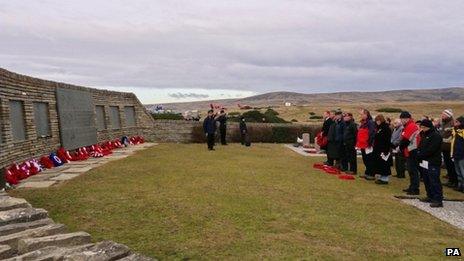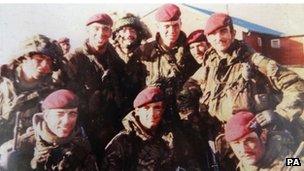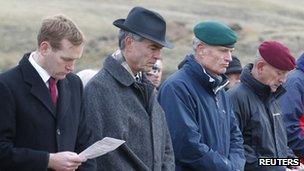Remembering the Falklands sacrifice 30 years on
- Published

Veterans and locals came together for a service of remembrance at San Carlos cemetery
All week, the Falklands have remembered and given thanks, as they do every year, for the sacrifices made in the 74 days it took to liberate these islands.
On Wednesday, islanders and veterans gathered in the small military cemetery overlooking San Carlos Waters to pay tribute to the 255 British servicemen who gave their lives to free the islands from occupation by Argentine forces 30 years ago today.
Fourteen of those servicemen are buried there, among them Colonel 'H' Jones, the commander of 2 Para who died leading the charge at Goose Green.
As the service drew to a close, the mist swirled down from the mountains, and snow began to fall, dusting the gravestones and the red poppies of the wreaths with white.
'Good friend'
Memories of the war here are undiminished by the passage of time - for islanders and veterans alike.
On Thursday, they will gather at the Liberation Memorial at Port Stanley, which looks across to the freezing waters of the South Atlantic to remember the sacrifices made, and give thanks to those who risked their lives.
Returning to the islands where they and their comrades fought is an emotional experience for many of the veterans. They remember all too well the nerve-wracking 8,000-mile journey to get here, and the bloody battles that ensued.

255 British servicemen lost their lives in the Falklands conflict
One of those paying his respects at the cemetery at San Carlos was Barry Avery, who sailed here on HMS Coventry as a young seaman.
"During the service, I was thinking about one of the lads who was killed on HMS Coventry, Adrian Sunderland, who was a good friend of mine," he says.
"We had planned to go down to Cornwall on holiday with a group of us when the war finished, but that never happened.
"Those memories are always there, though you do get used to things. I came back here in 2010, and coming back this year for the 30th anniversary was hopefully part of the closure for me."
Another veteran there was Gary Clement, who eventually married a local girl and lives on the islands.
"I was put up on the side of the bridge to look for enemy aircraft, and I couldn't stop my legs shaking. I had enough time to be frightened," he recalls.
'Extraordinary'
Some of the veterans find it hard to speak of their experiences - even after three decades - but all say they've been deeply touched by the gratitude of the Falkland islanders.
Steve Overall, who served on HMS Coventry, says: "Every time we've been back on the islands has been fantastic.
"Even the youngsters, 18-year-olds who weren't born when the war took place, walk up to you in the streets saying thank you. It's extraordinary."
At the Liberation Memorial will be a group of islanders who covertly helped British forces against the Argentine invaders in 1982.

Foreign Office minister Jeremy Browne, left, joined Falklands governor Nigel Haywood at the service
Farmer Trudi McPhee smuggled supplies to British troops - driving through the dark over the rough terrain in convoy, despite the dangers. She says these islands will remain forever in their debt.
"I think of all the families whose loved ones haven't returned. For what they did, I'll always be grateful. We'll always appreciate that, and they will always be in our thoughts."
Her anger at what she sees as Argentina's bullying is shared by many here. Their charter flights via Chile have been cut, and Argentina is now trying to take criminal proceedings against the oil companies drilling for oil in waters off the Falklands.
Today, the Argentine president will even try to press her country's case for sovereignty at the decolonisation committee of the United Nations, although the Falkland Islands are not a colony.
As for the islanders themselves, they possess a steely determination to preserve their identity as Falkland Islanders who are also British, even as Argentina once again tries to stake its claim.
Next year, the Falklands will hold a referendum on their future which is certain to send a clear signal to Buenos Aires that this rocky outcrop in the South Atlantic remains British to the core.
In a historical irony, it was Argentina's invasion 30 years ago that ultimately rescued these faraway islands from a slow drift into decline and neglect.
The wealth of the seas - first fish, and now oil - have brought with them a new-found confidence, not least in a capital which has almost doubled in size since 1982.
Their hope is that Argentina - a country of 40 million - will now allow the 3,000 people of the Falklands to live in peace, so that no further sacrifices need be made.